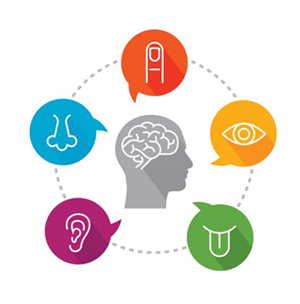Sensory integration therapy
 Sensory integration therapy (SIT) focuses on helping children with sensory processing issues by exposing them to sensory stimuli in a structured manner.
Sensory integration therapy (SIT) focuses on helping children with sensory processing issues by exposing them to sensory stimuli in a structured manner.
It is based on the theory that over time, the brain will adapt to the incoming sensations and allow children with these difficulties to process and react to sensations more efficiently.
For a “typically developing” child, sensory integration develops in the course of regular childhood activities. But, for some children, it does not develop as efficiently as it should. When this development is disrupted, a number of problems in learning, behaviour may become evident.
Not every child with learning, developmental or behavioural problems has an underlying sensory integration disorder. There are certain indicators, however, that can signal a parent that such difficulties may be present. These include:
OVERLY SENSITIVE TO TOUCH, MOVEMENT, SIGHTS, SMELLS, TASTES AND SOUNDS
This may be manifested in a number of behaviours such as withdrawal when touched, avoiding certain textures of clothes or food, distractibility, fearful reactions to ordinary movement like swinging or climbing.
UNDER-REACTIVE TO SENSORY STIMULATION
In contrast to the above, an under – responsive child may seek out sensory experiences such as crashing into people and objects. He or she may seem oblivious to pain or to body position.
UNUSUALLY HIGH OR LOW ACTIVITY LEVELS
The child may be constantly on the move or may be extremely slow and fatigue easily.
PROBLEMS IN COORDINATION
This can be observed in gross and fine motor activities. Some children may have unusually poor balance, while others may have difficulty in learning new tasks that requires gross or fine motor coordination.
DELAYED MILESTONES- SPEECH, LANGUAGE, MOTOR SKILLS, OR ACADEMIC ACHIEVEMENT
These may be evident in a pre-schooler along with other signs of poor sensory integration. Problems in academics may be seen despite normal intelligence.
POOR BEHAVIOUR AND POOR SELF CONCEPT
This child may be impulsive or distractible and show a lack of planning in approach to tasks. Some children have difficulty adjusting to new situations. Others may react with frustration, aggression, or withdrawal when they encounter failure.
At Plexus SI therapy is provided by a specially trained occupational therapist. The therapist determines after a thorough evaluation whether and how will the child benefit from SI therapy. A complete “sensory diet” is planned for the child and improvements are recorded on a weekly basis. An ongoing evaluation is carried out during the course of the treatment and any necessary modifications in the treatment plan are carried out.

